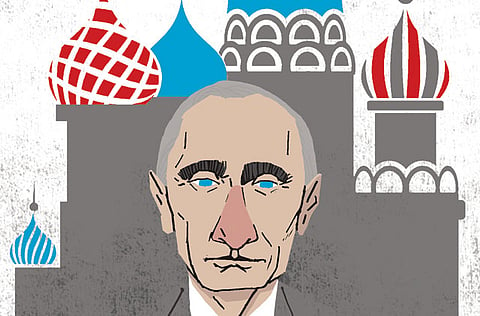The survivalist in the Kremlin
Putin has turned Russian legal and penal systems into instruments of repression

Vladimir Putin’s improbable rise to the pinnacle of Russian power in 1999-2000 was partly the result of an elite consensus about the importance of restoring order to the Russian state after a decade of domestic crisis and international humiliation. His rise was improbable, because Putin is no career politician, but someone whose worldview was shaped by his experience in the KGB, an institution that operated beyond public scrutiny and without fear of legal or other constraints.
Putin’s worldview, however, is far from unique in Russia. From his earliest days in the Kremlin, he established himself as a classic Russian conservative pursuing the goal of strengthening the Russian state.
Putin’s primary objective is to ensure the survival of Russia by defending it from threats to its territorial integrity, political sovereignty, and national identity. Just as KGB officers depicted themselves as the Soviet state’s ultimate protectors, so Putin believes that he alone is capable of effectively countering threats to Russia.
He is, in this sense, a ‘survivalist’, who believes that he has no choice but to maintain his grip on power. And, like a KGB officer, he turns people into assets that will further his goals.
At home, Putin has focused over the past year on dealing with his opponents — co-opting some and intimidating others by turning the Russian legal and penal systems into blunt instruments of repression. Abroad, he has moved to mitigate the blowback to Russia from a series of external political and economic shocks.
In the Middle East, Putin sees genuine threats to the Russian state’s survival from the Islamist parties that have risen to power in predominantly Sunni countries in the wake of the Arab Spring revolutions. These parties have shifted the regional balance of power away from secular governments, and Putin blames the US for empowering them through its attempts to impose democracy on the region.
Given Russia’s experience with indigenous militant groups seeking support from Arab extremists, Putin believes Russia’s domestic stability requires strong leaders in the Middle East who can keep extremists in check — and with whom he can deal directly.
This helps to explain why Putin’s Middle East policy rests on close relations with Syrian President Bashar Al Assad, Iran, and Israel. These three countries share — albeit for different reasons — Russia’s concern about the new religiously-inspired governments in the Middle East.
Meanwhile, the global economy continues to pose risks for the Russian state. Since first coming to power, Putin sought to cement Russia’s status and its global standing on the basis of superior economic performance. As Putin has stressed in several speeches, he believes that the Soviet Union, by focusing on an economically ruinous arms race with the US, fought the wrong battle against the West during the Cold War.
In Putin’s view, the Soviet Union collapsed under the weight of its debts. So the survival of the Russian state depends on its fiscal and economic strength, which also guarantees its sovereignty.
In the 2000’s, largely thanks to high oil prices, Putin paid off the state’s debts. He built up enormous foreign-currency reserves, which cushioned the blow of the 2008 global economic crisis. As oil prices rose from 2000 to 2008, Putin presided over a period of rapid GDP growth that put Russia on track to become the world’s fifth-largest economy.
Economic growth replaced military might as Russia’s most important indicator of success and earned it a spot in the so-called Brics grouping of the world’s major emerging economies, alongside Brazil, India, China, and South Africa. Russia’s growth generated jobs, boosted incomes, and contributed to a decade of domestic stability.
The future looks far less rosy. The economy has slowed. Most economists now believe that Russia cannot maintain annual GDP growth at a rate above 2 per cent without another sustained rise in oil prices. But 2 per cent growth (a respectable rate for an advanced economy) would represent a major blow to Russia’s standing and Putin’s personal prestige, and could endanger domestic stability if jobs are lost in critical manufacturing sectors.
Putin is perplexed about how to counter the threat posed by slow growth. His main proposal so far has been a ‘Eurasian Union’ — an expanded version of the current customs union among Russia, Belarus, and Kazakhstan. This would provide a platform to re-establish trade, transport, and other links among former Soviet countries and thus capture regional markets for Russian products, guarantee Russian jobs, and re-assert Russian political influence in its old neighbourhood.
But, by reclaiming a position of influence in the economies and politics of adjacent countries, Russia risks creating political tensions with the European Union. This November, at its ‘Eastern Partnership’ summit in Vilnius, the EU will decide on whether to proceed with an Association Agreement with Ukraine. Putin views this as a threat to Russia’s economic interests, because Ukraine is unlikely to join his Eurasian Union if it is aligned with the EU — and the Eurasian Union will not amount to much without Ukraine.
Putin’s statist focus and survivalist approach in dealing with the threats to Russia seem to lead him back to old formulations that put him at odds with the US and the West. In Syria, Putin is stuck standing behind Al Assad as he slaughters his citizens. In his own neighbourhood, Putin is presiding over the re-creation of a Soviet Union-lite, whose success or failure now depends on decisions made in Kiev, Brussels, and Vilnius, rather than in Moscow. In both cases, Putin risks provoking the ire of others and creating more blowback for Russia.
— Project Syndicate, 2013
Fiona Hill, a senior fellow at the Brookings Institution, is the author, with Clifford Gaddy, of Mr Putin: Operative in the Kremlin. This commentary is adapted from a speech at the London School of Economics.
Sign up for the Daily Briefing
Get the latest news and updates straight to your inbox



